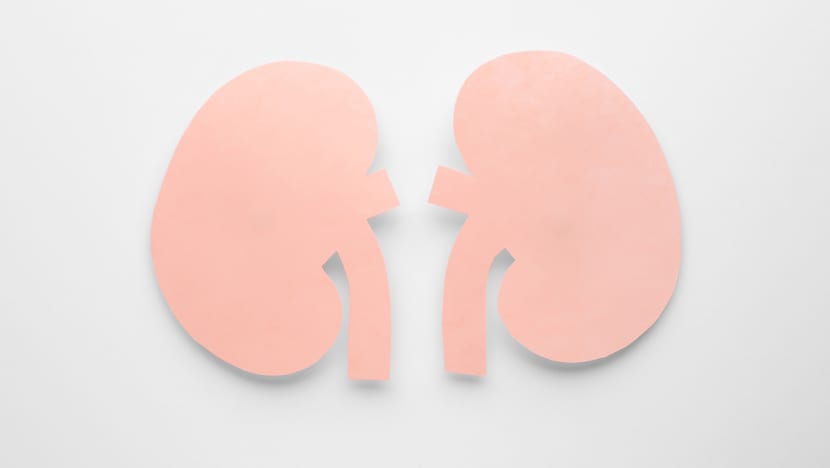A life-saving gift of love: He donated his kidney to restore his wife’s health
When Mrs Jennie Tan was diagnosed with end-stage kidney disease, her husband made a decision that gave her a second chance at life.

Mr Edwin Tan donated a kidney to his wife, who was battling end-stage chronic kidney disease, giving her a second lease of life. Photos: Farrer Park Hospital

This audio is generated by an AI tool.
The first sign something was wrong appeared last March when Mrs Jennie Tan noticed swelling in her leg. However, she did not think it was anything serious until she was hospitalised for issues relating to gout.
During her hospital stay, Mrs Tan received a diagnosis that came like a bolt from the blue: Blood test results revealed she had end-stage (stage 5) chronic kidney disease. Her kidneys were failing, and as a result, the mother of one would need lifelong dialysis.
Kidneys play a crucial role in filtering blood, regulating blood pressure and removing waste from the body. According to the National Kidney Foundation (NKF), while dialysis helps perform some of these functions for those with impaired kidney function, the average life expectancy for dialysis patients is between five and 10 years.
Eventually, most patients need a kidney transplant, but the NKF notes that the average waiting time for the procedure in Singapore is eight years.

NAVIGATING OBSTACLES AS A TEAM
Within the same month, Mrs Tan and her husband, Mr Edwin Tan, sought a second opinion from Dr Yang Wen Shin at Farrer Park Hospital. There, tests revealed toxic levels of waste in her body. The renal physician confirmed that dialysis was “inevitable” and advised her to begin dialysis twice a week immediately.
The news was devastating for the couple, who, in their 50s and married for 26 years, had built a life filled with shared experiences and future plans. Mrs Tan, who leads a team as head of finance, led an active lifestyle and frequently travelled for both work and leisure with her husband. To this day, she remains unsure about the exact cause of her condition, though she has a history of high blood pressure and gout.
Beyond the emotional strain, Mrs Tan had to make major lifestyle adjustments. She scaled back on her favourite activities, like gardening, and overhauled her diet – incorporating more high-protein foods such as eggs and lean meat while reducing her intake of sodium and potassium-rich foods.
Dialysis took a physical toll as well. Frequent bouts of high blood pressure, nausea and dizziness often forced her to take medical leave. Despite these challenges, she was determined to keep working and stay positive. To brighten her days, she and Mr Tan started a new tradition – visiting a different cafe every weekend. No matter how exhausting the treatments were, he was always there after each session to take her home. “He was always by my side, supporting me,” she said.
Unfortunately, Mrs Tan’s condition continued to decline. In response, Dr Yang increased her dialysis sessions to thrice a week. “The previous twice-weekly dialysis regime was insufficient for her needs, leading to worsening symptoms such as vomiting and fluctuating blood pressure,” he explained.
This made the consideration of a renal transplant even more urgent. It was then that Mr Tan raised a life-changing question: What if he donated a kidney to his wife?

‘I DID NOT WANT HER TO SUFFER’
In Singapore, more than 400 patients are currently waiting for a deceased-donor renal transplant. Finding an exact match for a kidney is rare, and living organ donations where organs are procured from living donors are even rarer.
“It was heartbreaking to watch her endure the effects of dialysis,” said Mr Tan. “She put up a strong front so I wouldn’t worry, but I could see her struggling. I love her very much and I could not bear to see her suffer any longer.”
Everything seemed to be in place for the couple to undergo surgery. Both are physically fit, and they even share the same blood type, which is traditionally a key factor in transplant compatibility.
However, according to Dr Yang, modern immunosuppressants have significantly reduced the chances of organ rejection, making successful kidney transplants possible even between donors and recipients with different blood types. Similarly, kidney size, once a limiting factor, is no longer a major concern.
“Mr Tan had no doubt that he wanted to be considered for donation,” said Dr Yang. However, Mrs Tan was uncomfortable with the idea as she worried about the potential risks to her husband’s health.
“It was difficult to convince her as she was afraid the surgery would affect my well-being,” said Mr Tan. “I told her I simply wanted her to be free of her pain. The doctors were also very positive and reassured her that everything would be fine.”
A NEW LEASE ON LIFE
The living donor transplant was performed by a surgical team led by urologist Dr Lee Fang Jann and general surgeon Dr Chia Kok Hoong.
Following a thorough assessment, Dr Lee determined that Mr Tan was an ideal candidate for a laparoscopic donor nephrectomy – a minimally invasive procedure that removes a kidney from a living donor using a camera and small abdominal incisions.
The surgery took place in December last year, less than a year after Mrs Tan’s diagnosis. It was a milestone for Farrer Park Hospital, marking its first living donor transplant since its founding in 2016. The procedure was a success, with the transplanted kidney functioning immediately.
“Mrs Tan was up and walking in the ward just six days after surgery,” said Dr Yang. “However, as with all transplant recipients, she will require long-term immunosuppressants and lifelong monitoring of her metabolic parameters.”

For Mr Tan, the recovery process was “challenging” in more ways than one. As his wife was recovering in the intensive care unit after the transplant, he had to wait two days before seeing her. “I missed her so much that I broke down when I finally saw her again,” he shared.
He also experienced pain at the incision site and a sense of “emptiness” where his kidney had been removed. Still, he remains grateful to Dr Lee and Dr Yang for their support throughout his recovery. More than anything, he finds comfort in knowing his wife is healthy again.
“I just want my wife to make a full recovery, so we can return to our old life – travelling and enjoying each other’s company as a couple,” he said. “I look forward to growing old with her.”
Mrs Tan added: “Nothing else matters if you don’t have good health. I am so lucky to have Edwin in my life. My goal is to stay healthy so we can enjoy many more years together and see our daughter get married and start a family.”
Renal health care is crucial, as early detection and prevention can help avoid serious complications. For more information, visit the Farrer Park Hospital website.













